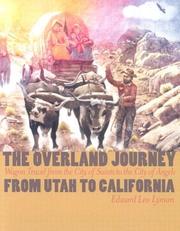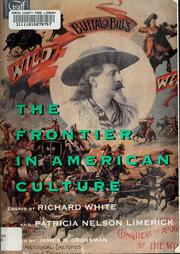| Listing 1 - 6 of 6 |
Sort by
|
Book
Year: 1867 Publisher: [Washington, D.C.] : [U.S. Government Printing Office],
Abstract | Keywords | Export | Availability | Bookmark
 Loading...
Loading...Choose an application
- Reference Manager
- EndNote
- RefWorks (Direct export to RefWorks)
Military orders. --- Wagon trains. --- Security systems. --- West (U.S.) --- Defenses.
Book
Year: 1946 Publisher: New York : Pocket Books,
Abstract | Keywords | Export | Availability | Bookmark
 Loading...
Loading...Choose an application
- Reference Manager
- EndNote
- RefWorks (Direct export to RefWorks)
Wagon trains --- Frontier and pioneer life --- Overland journeys to the Pacific --- Oregon National Historic Trail --- California --- Gold discoveries --- Fiction.
Book
Year: 1858 Publisher: [Washington, D.C.] : [publisher not identified],
Abstract | Keywords | Export | Availability | Bookmark
 Loading...
Loading...Choose an application
- Reference Manager
- EndNote
- RefWorks (Direct export to RefWorks)
Cattle. --- Claims. --- Malicious mischief. --- Vandalism. --- Pillage. --- Wagon trains. --- Harney, William S. --- Dakota Indians. --- Kerr, Brierly and Company.
Book
Year: 1862 Publisher: [Washington, D.C.] : [U.S. Government Printing Office],
Abstract | Keywords | Export | Availability | Bookmark
 Loading...
Loading...Choose an application
- Reference Manager
- EndNote
- RefWorks (Direct export to RefWorks)
Claims. --- Malicious mischief. --- Vandalism. --- Freight and freightage. --- Freight and freightage --- Pillage. --- Indians of North America --- Judicial opinions. --- Merchants. --- Wagon trains. --- Awards. --- Pensions.

ISBN: 087417645X 9780874176452 0874175011 9780874175011 9780874177527 Year: 2004 Publisher: Reno University of Nevada Press
Abstract | Keywords | Export | Availability | Bookmark
 Loading...
Loading...Choose an application
- Reference Manager
- EndNote
- RefWorks (Direct export to RefWorks)
"The wagon trail between Salt Lake City and Los Angeles is one of the most important and least-known elements of nineteenth-century Western migration. Known as the Southern Route, it included the western half of the Old Spanish Trail and was favored because it could be used for travel and freighting year-round. It was, however, arguably the most difficult route that pioneers traveled with any consistency in the entire history of the country. Following not rivers but leading from one - sometimes dubious - desert watering place to the next and offering few havens for the sick, weary, or unfortunate." "Historian Edward Leo Lyman has provided the first history of the complete Southern Route, and of the people who developed and used it. Based on extensive research in primary sources - including many early travelers accounts - and on Lyman's own investigation of the route and its branches, the book discusses the exploration and development of the Old Spanish Trail. Its horse thieves and traders, including Jedediah Smith and Kit Carson, along with government explorer John C. Fremont. Developing the old pack mule trail as a wagon road between Salt Lake City and Los Angeles, miners heading for the California gold fields first used the route extensively. Mormon missionaries and the colonisers of San Bernardino and other communities also traveled that way, as did a wide array of mail carriers, soldiers, and world travelers. Later, a steady stream of Anglo-American emigrants seeking new homes or fortunes in California shared the road with a surprising number of freight-wagon operators. The trail passed through the territories of numerous Native American peoples, and contacts with them - both friendly and hostile - played a significant role in the experiences of travelers and in the fates of Native American cultures in this region. Lyman's discussions of Mormon-Indian relations and of the infamous Mountain Meadows Massacre offer fresh and important analyses of these vital aspects of the westward movement."--Jacket.
Mormon pioneers --- Pioneers --- Wagon trains --- Frontier and pioneer life --- Trails --- Overland journeys to the Pacific. --- First settlers --- Settlers, First --- Persons --- Caravans of covered wagons --- Caravans of wagons --- Covered wagon caravans --- Emigrant trains --- Trains, Wagon --- Wagon caravans --- Transportation --- Backcountry routes --- Backcountry tracks --- Bridle paths --- Bush tracks --- Bush walks --- Foot paths --- Foot trails --- Footpaths --- General purpose trails --- Hiking routes --- Hiking trails --- Horse trails --- Multi-use trails --- Multiple-use trails --- Paths (Trails) --- Recreation trails --- Recreational trails --- Routes, Backcountry --- Routes, Hiking --- Tracks (Trails) --- Tramping tracks --- Walking tracks --- Walks (Trails) --- Walkways (Trails) --- Hiking --- Mountaineering --- Roads --- Walking --- Transcontinental journeys (United States) --- Travels --- Voyages and travels --- History --- West (U.S.) --- History, Local. --- Description and travel. --- Description and travel --- Latter Day Saint pioneers

ISBN: 1283382121 9786613382122 0520915321 0585115508 9780520915329 9780585115504 9780520088436 0520088433 9780520088443 0520088441 0520088433 0520088441 9781283382120 6613382124 Year: 1994 Publisher: Berkeley University of California press
Abstract | Keywords | Export | Availability | Bookmark
 Loading...
Loading...Choose an application
- Reference Manager
- EndNote
- RefWorks (Direct export to RefWorks)
Log cabins and wagon trains, cowboys and Indians, Buffalo Bill and General Custer. These and other frontier images pervade our lives, from fiction to films to advertising, where they attach themselves to products from pancake syrup to cologne, blue jeans to banks. Richard White and Patricia Limerick join their inimitable talents to explore our national preoccupation with this uniquely American image. Richard White examines the two most enduring stories of the frontier, both told in Chicago in 1893, the year of the Columbian Exposition. One was Frederick Jackson Turner's remarkably influential lecture, "The Significance of the Frontier in American History"; the other took place in William "Buffalo Bill" Cody's flamboyant extravaganza, "The Wild West." Turner recounted the peaceful settlement of an empty continent, a tale that placed Indians at the margins. Cody's story put Indians-and bloody battles-at center stage, and culminated with the Battle of the Little Bighorn, popularly known as "Custer's Last Stand." Seemingly contradictory, these two stories together reveal a complicated national identity.Patricia Limerick shows how the stories took on a life of their own in the twentieth century and were then reshaped by additional voices-those of Indians, Mexicans, African-Americans, and others, whose versions revisit the question of what it means to be an American.Generously illustrated, engagingly written, and peopled with such unforgettable characters as Sitting Bull, Captain Jack Crawford, and Annie Oakley, The Frontier in American Culture reminds us that despite the divisions and denials the western movement sparked, the image of the frontier unites us in surprising ways.
Frontier and pioneer life --- Border life --- Homesteading --- Pioneer life --- Adventure and adventurers --- Manners and customs --- Pioneers --- History --- Turner, Frederick Jackson, --- Buffalo Bill, --- Cody, William Frederick, --- Cody, William F. --- Bill, --- Cody, W. F. --- Cody, Buffalo Bill, --- Cody, Bill, --- Tʻe-na, --- Tʻe-na, Fo-lei-te-li-kʻo Chieh-kʻo-hsün, --- Turner, F. J. --- F. J. T. --- T., F. J. --- West (U.S.) --- American West --- Trans-Mississippi West (U.S.) --- United States, Western --- Western States (U.S.) --- Western United States --- Exhibitions --- Exhibitions. --- West (U. S.) --- History of North America --- anno 1800-1999 --- american culture. --- american hero. --- american history. --- american west. --- annie oakley. --- buffalo bill. --- columbian exposition. --- cowboys. --- custer. --- empty continent. --- folk tales. --- folklore. --- frontier. --- indians. --- indigenous peoples. --- jack crawford. --- land rights. --- little bighorn. --- log cabins. --- manifest destiny. --- military. --- national identity. --- native americans. --- nonfiction. --- oregon trail. --- pioneers. --- popular culture. --- settler colonialism. --- settlers. --- settling the west. --- sitting bull. --- wagon trains. --- western movement. --- western. --- wild west show. --- wild west.
| Listing 1 - 6 of 6 |
Sort by
|

 Search
Search Feedback
Feedback About UniCat
About UniCat  Help
Help News
News